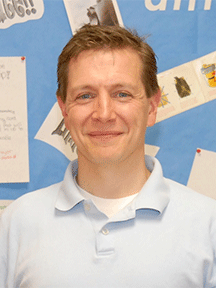By Edith Nicolaou-Griffin
Phi Beta Kappa member Garreth Heidt has been named the 2012 Cynthia M. Barry Touchstones Teacher of the Year by the Touchstones Discussion Project, a school program designed to foster critical thinking and social skills through class discussion.
Heidt works as a middle school Humanities Teacher and Debate Coach in Collegeville, Pennsylvania, where he has been using the Touchstones program for almost fourteen years. He was instantly attracted to its innovative, interdisciplinary approach, as well as its emphasis on interaction between students—a method not far from the liberal arts education Heidt received as an undergraduate majoring in English at Temple University.
Heidt firmly believes that his goal as a teacher does not merely involve helping students pass tests but engaging them in the lifelong quest for knowledge that defines the liberal arts’ philosophy of thinking. Because of its unique ability to promote pro-social goals, Heidt believes the Touchstones program could have a positive effect on bullying. He is currently trying to expand the successful program throughout the entire school, and eventually the rest of the district.
Heidt served as a council member of the Phi Beta Kappa Association of the Delaware Valley from 2000 until 2005. During that time he visited high schools in the area to speak to students and publicize ΦBK, where he used William Cronon’s essay “Only Connect: The Goals of a Liberal Arts Education,” originally published in the The American Scholar in 1998, as a reference point for conversation. Heidt quoted Cronon’s essay in both the interview for his district and through his acceptance speech for the award on December 1 at St. John’s College in Annapolis, Maryland.
According to Heidt, the Touchstones program embodies all of the goals proposed in Cronon’s essay about empowering and teaching students how to become better thinkers and communicators. He further underscores the civic purpose of an education to help students explore and fulfill their talents, become producers of value, and learn how to give back to their own communities.
Heidt acknowledges the foundations of this ‘humanitarian’ movement in education were inspired from broader concepts, traditionally incorporated in the field of design, that require an inquisitive and problem-solving mindset. “Liberally educated people should be able to move and do great things beyond just thinking great thoughts,” Heidt says. In a paper presented at the annual conference of the Industrial Designers Society of America’s Education Symposium he raised two simple but essential questions that capture the mentality he strives to cultivate in his students: “Why are things the way they are? And, how can we make things better?”
Heidt anecdotally describes the first time he heard about Phi Beta Kappa at age seven on an episode of Leave It to Beaver, when Ward Cleaver tells his son Wally that he does not care where he goes to college as long as he gets into Phi Beta Kappa. Remembering this story now, as a 1990 graduate of the Rho Chapter of Temple University in Philadelphia, Heidt actively reaffirms his belief in the power of a liberal arts education on a day to day basis. “That belief is founded in the deep gratitude I have for, and the enduring learning I’ve experienced through my connection with Phi Beta Kappa,” Heidt says.
Edith Nicolaou-Griffin is junior at Davidson College majoring in the liberal arts. Davidson College is home to the Gamma of North Carolina chapter of Phi Beta Kappa.




